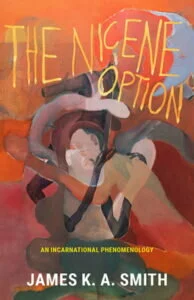Marci Rae Johnson, Basic Disaster Supplies Kit: Poems (Steel Toe Books, 2015)
In Basic Disaster Supplies Kit, her second collection, Marci Rae Johnson explores love, parenthood, and the Christian life in the context of life on-line, reveling in the Internet’s speed, distortion, and telescoping of time and space.
Her poems absorb and transform distant galaxies, potential catastrophes, world clocks, crowds at rock concerts, and, in one case, an image gone viral on the Internet. It makes a big difference, of course, when your powers are magnified a thousand-fold. No more so when you have a lightning-quick search engine capable of indulging the whimsical desire to know how fast a body will decompose. Or when you want nothing more than to be “Surfing the Internet with Karl Marx,” as one of her titles puts it. This fusion of bare life and life on-line might have gone horribly wrong, but Basic Disaster Supplies Kit remains deeply human, and humorous, at heart.
The delights of this collection begin with the table of contents, which is enjoyable to read on its own. Titles combine the religious and scientific (“Jesus Accelerates a Particle”), while offering differences in tone (“You Make Me Feel Like a Natural Mummy”) and register (“Springfield Fire Department Offers Turkey Fryer Safety Tips”).
A strength of these poems is the way Johnson makes plain speech go off-kilter. For instance, what could sound like moralizing becomes newly surprising through a shift in tone. In “Segway Owner Dies in Segway Crash,” I grinned upon reading the deadpan observation that “it’s better / to lose control let go of the handle / bars” before rolling off the edge of a cliff. But the next clause follows with a striking image that reverberates between land and air: “and fly the blue sky washing / away in the river.”
Johnson is able to charge flat language with wonder in lines like “Never enough time to love and be loved” or “he knows you do not need what you want.” Even false logic has a ring of truth to it, as in “Jesus Heals a Woman in the Crowd”: “it’s heaven again / because the music’s so loud I can’t / remember the thing he forgot to tell me.”
Johnson is adept at re-energizing platitudes. “Worldometers Real-Time Statistics” ponders the constantly turning dials of a world clock which records, among other things, the number of births, deaths, computers produced per year, and emails sent per day. For the poet, the numbers represent a species of vastness that is different from “what you meant / when you told me you’d love me forever.” It is pleasing to encounter the familiar lover’s vow in unfamiliar territory. Cliché is repurposed, as love resists quantification.
Irony is an engaging feature in many of the poems. In “Mr. Rogers Is Flipping You Off,” Johnson takes on a childhood icon with irreverence and affection. The poem refers to a screen grab from a 1967 episode of the PBS show that circulated on the Internet. The image captured the moment the innocuous Rogers, while leading children in song, bared his middle finger to the world. Out of context, the childhood icon seems to be performing an act of defiance that is at odds with his squeaky clean image. Turning an irreverent gaze on 1960s and 70s popular culture, the image of Mr. Rogers’ middle finger embodies a hipster’s dream of authenticity—an Easy Bake-oven-creation of innocence and knowingness.
Yet Johnson’s keen observation and associative leaps push her poems beyond irony, taking readers on a more sustained and interesting journey. In “Mr. Rogers,” the middle finger is not defiant but, rather, carries the force of prohibition. Mr. Rogers is a father-figure “count[ing] the middle / finger of his right hand without irony like / your father in church, pointing to the Bible / verse.” The verse in question is garbled and misheard by the child as “do not comet adultery.” The distortion provides a moment of humor, followed by a shift of scene back to the present: “The man and woman / in the movie today about the end / of the world have managed not to love / each other until now.” Mr. Rogers’ middle finger has morphed, by a kind of dream logic, into the apocalyptic romance of the recent movie.
Basic Disaster Supplies Kit is at its best when it reinvigorates religious language and the clichés of evangelical culture. A case in point is her reimagining of parables and miracles from the New Testament. Her titles could be subheadings copied straight from the New International Version of the gospels: “Jesus Heals a Woman in the Crowd,” “Jesus Cleanses a Leper,” “The Man with the Unclean Spirit,” “Jesus Calms the Storm,” “Jesus Curses the Fig Tree.” The titles join in productive counterpoint with the subjects of the poems, which translate readers to more contemporary scenes such as the Double Door concert hall in Chicago’s Wicker Park.
My favorite in this group is “The Parable of the Great Banquet.” In Luke’s gospel, the parable focuses on those who are invited to a banquet. But they are too busy, distracted by the cares of life, to recognize the kind of offer that has been presented to them. One has just bought a field. Another has just bought oxen. The third is recently married. Johnson’s poem forges a first-person composite of these three perspectives as a means of examining life’s frustrations. The lyric “I” affirms the scriptural account while allowing readers to inhabit the perspective of those left out of the banquet. Her reason for declining the invitation is her attachment to the field littered with the “leaves from last / year’s disappointment.” The field, full of “stumps that refuse digging and flogging,” cannot be cleared, and yet her continuing efforts become “forms of affection.” Belaboring our disappointments, returning to them again and again, could have been described as a pathological obsession. Here, however, it takes the form of seductive, misguided love, where “I put my arms around the / the tallest oak and kiss / the dark root.” The parable is made lyric, and the kernel of the biblical account is preserved in a new story about the inability to let go of the past.
Basic Disaster Supplies Kit is engaging, irreverent, and tenderly self-conscious. Johnson’s range is impressive. She has developed a style capable of incorporating such disparate subjects as particle physics, reading to her kids, thoughts on the Astronomy Picture of the Day, and quirky news stories that come to mind while sitting in the dentist chair.
One last example of Johnson’s dizzying, invigorating range may suffice. The poem “Take the Plank Out of Your Own Eye” takes imaginative flight in the midst of a grocery store. As Johnson grows frustrated with fellow shoppers, like those “aliens using the self-check out line,” there comes a moment of transformation that marries surrealism and self-examination with lyric reminiscence: “there’s an eerie blue / light advertising a special / on my right breast and suddenly I am writing a poem.”
These moments of transformation, which send us down unexpected paths, capture the strength and achievement of Johnson’s collection.








Comments
Be the first one to make a comment!